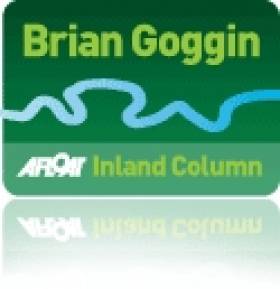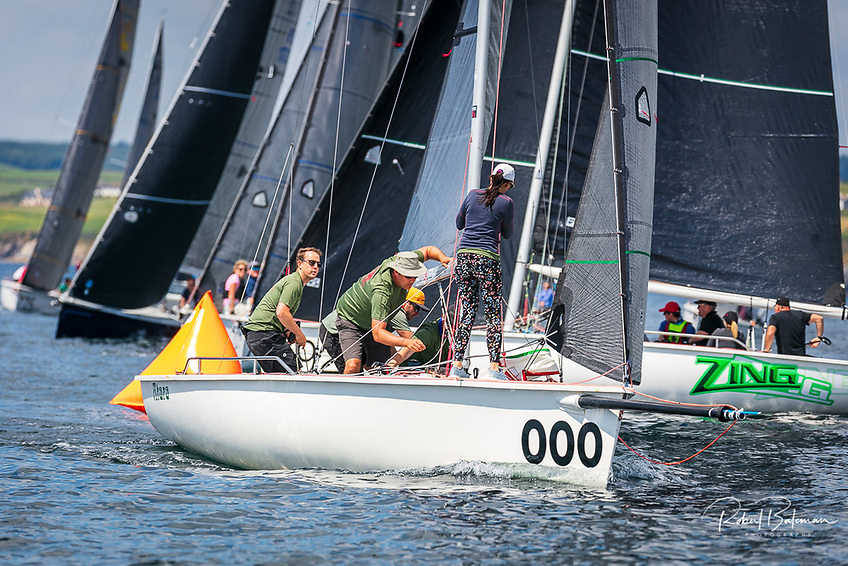Displaying items by tag: Waterways Traffic
Down On Derg
For the last couple of years, we've done some long-distance boating; indeed in 2011 we didn't get to Lough Derg until the end of September. So we decided that, this year, we were not going anywhere north of Portumna: we would spend the year down on Derg.
Here are some of my impressions of the season. Some of them I may be able to check later, by looking for statistics or reports; some can't be checked because there are no statistics.
Weather
My first impression is that summer ended some time around May, with relatively little sunshine after that.
Even the nature of bad weather seems to have changed: the Royal Canal ran out of water in Spring but the Shannon had rather a lot of water throughout the summer. From time to time reports came from upstream of strong flows that made navigation difficult; down on Derg, Killaloe seemed to have strong currents quite a lot of the time, with water being pulled down the headrace to Ardnacrusha.
Met Éireann's report for the summer (June, July, August) seems to support that view: rainfall above average, sunshine and temperatures below average. It also seemed to me that we had more northerly winds than usual: the south-westerlies didn't seem to be the prevailing winds. However, the report says nothing about winds.
Numbers
My second impression is that lots of people have disappeared: that very few boats were moving on the lake this year: it was as if we were back to the early 1980s. I'll get the traffic figures from Waterways Ireland later: they cover only passages through locks and moving bridges, so they don't say anything directly about lake traffic, but they do give an idea of volumes.
Now, I may not be the best judge of numbers of boat movements because, if I hear there's a big boaty event on, I go somewhere else. But there seemed to be times when there was nothing moving on the middle of the lake, except sailing boats racing from Dromineer, Garrykennedy or Mountshannon. There weren't even many jetskis or speedboats around.
There were rumours of larger boats being sold to overseas buyers and transported out of the country, but I don't know how to check that. Even checking the total number of Shannon boat registrations wouldn't help: as there is no annual registration fee, there is no incentive for former owners to de-register boats that have been sold.
Dromineer
My third impression is that shore-based activity has diminished too.
As we keep our boat in the Shannon Sailing marina in Dromineer, we don't often use the public harbour, but we drive by it en route to the marina. It seemed to me to be pretty lifeless. Numbers of visiting boats seemed to be down (while numbers of resident boats rose), as did numbers visiting by land. (I don't know of any source of statistics for this; if there is one I'd like to know.)
I imagine that the poor weather kept land visitors away, except on the few sunny days. But I don't think that the improvements made a few years ago — path, pebbles, seats and so on — have done much to attract people. Dromineer needs to do more to establish itself as a place to visit, with things for people to do when they get there.
Harbour hoggers
My fourth impression is that harbour-hogging — leaving boats in public harbours for more than the permitted numbers of days, instead of paying for berths in private marinas — is on the increase. I don't know of any statistics on this, although I suspect that Waterways Ireland may have some. Its staff do patrol the harbours and record registration numbers, occasionally applying stickers to errant boats, so I imagine that they keep records of the numbers.
The problem is that WI has very little power, under the current bye-laws, to do anything effective. It needs a simple, cheap method of imposing ever-increasing charges on harbour-hoggers — and of enforcing payment. Experience with both the household charge and the mineral oil tax suggests that drastic steps may be required.
Other privatisers
The same may apply to other services that WI provides. Its very welcome supply of electricity can at least be controlled, with charges paid by card. However, I suspect that, when water charges are introduced, WI will have to devise a method of charging for water. Whether or not it wants to subsidise boaters, it is unlikely to want to supply folk who drive to its harbours to fill barrels and bottles with water (I have photographed folk doing just that).
And then there's the rubbish problem. Bins have been removed from some harbours on the west side of Lough Derg; a WI notice says that it has a "Leave No Trace" policy, or some such thing. That doesn't explain why there are still bins at harbours on the east side; I suspect that the explanation is in different arrangements with different local authorities. However, overseas tourists (if there are any) are likely to find it a little inconvenient to bring their holiday rubbish home with them, especially if they're flying by Ryanair.
But you can see WI's problem: if it makes free bins available, folk will drive from miles around to avoid paying charges. So, given that Irish folk are unlikely to develop civic-mindedness in the near future, the best solution is to use smart-card controlled bins, with each opening of the lid traceable to the individual boat-owner (or camper-van-owner). The same cards could control the other services and provide WI with a way of tracing user movements.
Supply and demand
The problem with free services is that they're too good to last: the provider, especially if it gets its money from an overstretched state, eventually realises it can't continue to provide them for nothing. So, just as declining income and other pressures reduce demand for its product, Waterways Ireland may find itself imposing extra charges that further reduce demand. It is not clear that any marketing campaign can compensate for the economic pressures on the sector.





























































